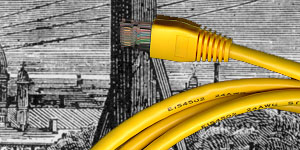


Pregnant with Possibility
Only connect! That was the whole of her sermon. Only connect the prose and the passion, and both will be exalted, and human love will be seen at its highest.Today's computer technology is rapidly turning us into three completely new races: the superpoor, the rich, and the superrich. The superpoor are perhaps eight thousand in every ten thousand of us. The rich---me and you---make up most of the remaining two thousand, while the superrich are perhaps the last two of every ten thousand. Roughly speaking, the decisions of two superrich people control what almost two thousand of us do, and our decisions, in turn, control what the remaining eight thousand do. These groups are really like races since the group you're born into often determines which group your children will be born into.
E. M. Forster,
Howards End
Only the rich and superrich have the opportunity, education, and resources to own and use computer technology. It's hard to get excited about computers when you're busy starving to death; or living in a tense matrix of drugs and crime and fear; or being forced to prostitute yourself for food and shelter; or being repressed by your own government.
A boy in Bangladesh, a girl in Somalia, or---perhaps saddest of all---many ghetto children in the world's richest countries, might never be able to step onto the world stage that is the net. Working their way among the destroyed buildings and equally destroyed social structures of their environment, they are permanently disenfranchised from the world many of us take for granted. Computers alone cannot erode that mountain of destitution.
Today, we number nearly six thousand million people, but we have only five hundred million telephones---one for each twelve of us. Half of us have never placed a single telephone call in our lives. There are already well over a hundred million computers, and over sixteen million more are added each year---with the number rising rapidly. In a decade or two, five hundred million of us may be connected to a computer network. That connection might eventually make the difference between being an information-starved peon and a global villager.
It is often said that computers will destroy ancient power centers and enfranchise greater masses of people. It is true that in America over a third of all households already have computers. Yet that proportion jumps to well over half for homes with university graduates and to three-quarters for homes with incomes above seventy-five thousand dollars. If that pattern is repeated in the world as a whole, computers might merely ensure that the ancient pyramid of power extends into a thin sharp spike, with a tiny few determining the fate of the millions.
By the time that happens, however, there should be a few hundred million people active on the net. (Just think, a global electronic community of a hundred million gossipers.) Perhaps among them will be enough people both connected to the rest of us and compassionate enough to speak for the dispossessed. Perhaps.
Every new communication medium is special. But the net is extra special, because we, the users, are the ones making it, not some faceless corporation. It's growing as fast as it is because it merges two hugely endowed technologies: computers and communications. But it's also growing rapidly because the more people who get on it, the more valuable access to it becomes. Like telephones and fax machines, tennis clubs and bars, the net becomes more attractive as more of us join it. So it's likely that everyone who can afford to will be on the net in fairly short order.
We're gregarious, gossipy creatures, continually talking to each other to find out what others think---or what we should think. Out of that reliance we build community, whether in a pub, at the laundromat, or on the net. Without that communication, that bonding, human society would cease to be. But the net presents numerous dangers too. The search for communion could easily turn into a flight from community. Don't like your neighbors? No problem; turn off, tune in, and drop into a whole other world of people you never have to actually touch. Further, as its demographics broaden and it goes commercial, the net's content will inevitably become more splintered, more trivialized, and perhaps more acrimonious. That's the way of things.
Computers won't bring about a better world---perhaps nothing can do that. But they certainly can change the world: in some ways for the better; in others, for the worse. That's the nature of today's new technology. By changing things in fundamental ways right before our eyes, it lets us see more clearly who we really are by showing us what we truly value. Sometimes, perhaps far more often than necessary, what we see is an ugly side of human nature.
Still, the net today is a glorious experiment. Considering that no one planned it and no one controls it, it shows us that we can make very complex systems work despite our many flaws. As it quickly commercializes, and changes drastically, we should work to preserve some of its more democratic and humane characteristics. Because that's something to be proud of.
Only connect.